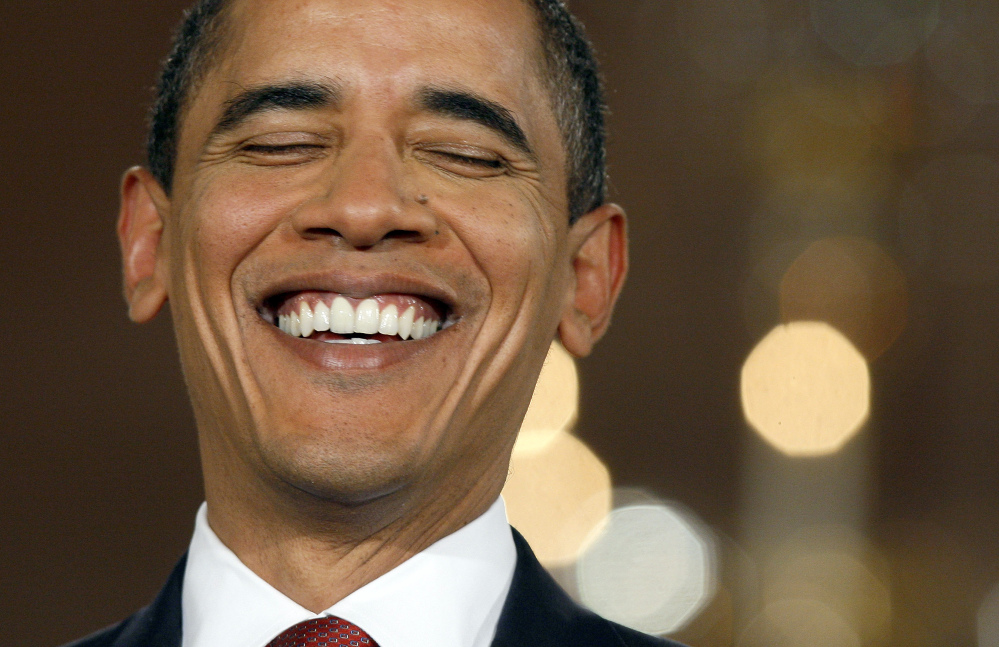WASHINGTON — Nice guy, so-so president.
Taking stock of President Barack Obama at the five-year mark in his term, less than a third of Americans consider him to be an above-average chief executive. Nearly twice as many find him likable.
A new Associated Press-GfK Poll finds the president’s personal image to be on the rebound after taking a hit during the government shutdown late last year, with 58 percent now sizing him up as very or somewhat likable. That’s up 9 percentage points from October, just after the shutdown.
Yet as Obama prepares to stand before Americans for his annual State of the Union address on Tuesday, people are largely pessimistic about the country’s direction, down on the condition of the economy and doubtful it will bounce back anytime soon. Unemployment? Seventy percent think it will go higher or stay the same.
Obama “wasn’t a total disappointment,” allows Joshua Parker, a 37-year-old small businessman in Smyrna, Tenn. “He didn’t put us into a Great Depression.”
But Parker, a self-described political independent and conservative, suspects that someone who understood the economy better could have done more.
“He would probably be a guy I would like to hang out with if he wasn’t president,” says Parker. “But I like a lot of people who are not qualified to be president.”
Across the country, Democrat Sabrina Carag, a 58-year-old retired accountant in Pleasanton, Calif., gives the president higher marks on both performance and personality.
If things aren’t great in the country, this former Republican reasons, it’s the fault of her old party and the Republicans in Congress.
“They block him every step of the way,” says Carag. “I don’t think it’s fair for them to say he’s been a bad president. How can you do anything if your hands are tied?”
From Huntsville, Texas, 51-year-old Wes Brummett thinks the economy will improve eventually — but it may be up to his grandchildren to do it.
Obama, this Democrat says, seems like an all-right guy and a good dad, but “he needs to show more leadership.”
“People are getting disheartened,” says Brummett, a self-employed computer systems administrator.
On the cusp of his sixth year in office, Obama is far removed from those heady days before his first inauguration, when two-thirds of Americans predicted he’d be an outstanding or above-average president.
Now, 31 percent think he’s been outstanding or above average, a quarter size him up as average, and 42 percent describe his presidency as below average or poor.
The ranks of those who believe he’s been outstanding or above average have edged down 6 points since just after Obama’s re-election in November 2012, reflecting slippage in how he’s viewed by Democrats, particularly liberals.
And while Obama’s likability numbers have recovered somewhat, doubts about his decisiveness and honesty persist. More than half of Americans wouldn’t describe him as decisive or honest. Fifty-two percent don’t find him particularly inspiring.
The president’s overall approval rating has remained fairly stable, with 45 percent approving and 53 percent saying they don’t. He’s picked up a little support, however, on his handling of unemployment and the federal government. People still view him negatively on both issues, but the share that disapproves has dropped 7 percentage points on each issue since October, largely a reflection of greater support among independents.
Congress continues to take its own outsized lumps in the polls as well. Just 14 percent of Americans approve of the way legislators are handling the job — up from a low of 5 percent after the government shutdown, but still nothing to celebrate. More than 9 in 10 Republicans say they disapprove of the way Congress is handling its job. It’s the first time that’s happened in AP-GfK polling since Republicans took control of the House after the 2010 elections.
The AP-GfK Poll was conducted Jan. 17-21, 2014, using KnowledgePanel, GfK’s probability-based online panel designed to be representative of the U.S. population. It involved online interviews with 1,060 adults. The survey has a margin of sampling error of plus or minus 3.9 percentage points for all respondents.
Survey respondents were first selected randomly using phone or mail survey methods and were later interviewed for this survey online. People selected for KnowledgePanel who didn’t otherwise have access to the Internet were provided with the ability to access the Internet at no cost to them.
Send questions/comments to the editors.



Comments are no longer available on this story